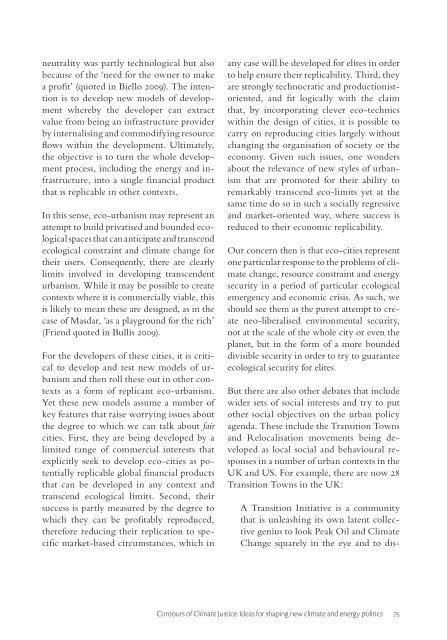Contours of Climate Justice - Dag Hammarskjöld Foundation
Contours of Climate Justice - Dag Hammarskjöld Foundation
Contours of Climate Justice - Dag Hammarskjöld Foundation
Create successful ePaper yourself
Turn your PDF publications into a flip-book with our unique Google optimized e-Paper software.
neutrality was partly technological but also<br />
because <strong>of</strong> the ‘need for the owner to make<br />
a pr<strong>of</strong>i t’ (quoted in Biello 2009). The intention<br />
is to develop new models <strong>of</strong> development<br />
whereby the developer can extract<br />
value from being an infrastructure provider<br />
by internalising and commodifying resource<br />
fl ows within the development. Ultimately,<br />
the objective is to turn the whole development<br />
process, including the energy and infrastructure,<br />
into a single fi nancial product<br />
that is replicable in other contexts.<br />
In this sense, eco-urbanism may represent an<br />
attempt to build privatised and bounded ecological<br />
spaces that can anticipate and transcend<br />
ecological constraint and climate change for<br />
their users. Consequently, there are clearly<br />
limits involved in developing transcendent<br />
urbanism. While it may be possible to create<br />
contexts where it is commercially viable, this<br />
is likely to mean these are designed, as in the<br />
case <strong>of</strong> Masdar, ‘as a playground for the rich’<br />
(Friend quoted in Bullis 2009).<br />
For the developers <strong>of</strong> these cities, it is critical<br />
to develop and test new models <strong>of</strong> urbanism<br />
and then roll these out in other contexts<br />
as a form <strong>of</strong> replicant eco-urbanism.<br />
Yet these new models assume a number <strong>of</strong><br />
key features that raise worrying issues about<br />
the degree to which we can talk about fair<br />
cities. First, they are being developed by a<br />
limited range <strong>of</strong> commercial interests that<br />
explicitly seek to develop eco-cities as potentially<br />
replicable global fi nancial products<br />
that can be developed in any context and<br />
transcend ecological limits. Second, their<br />
success is partly measured by the degree to<br />
which they can be pr<strong>of</strong>i tably reproduced,<br />
therefore reducing their replication to specifi<br />
c market-based circumstances, which in<br />
any case will be developed for elites in order<br />
to help ensure their replicability. Third, they<br />
are strongly technocratic and productionistoriented,<br />
and fi t logically with the claim<br />
that, by incorporating clever eco-technics<br />
within the design <strong>of</strong> cities, it is possible to<br />
carry on reproducing cities largely without<br />
changing the organisation <strong>of</strong> society or the<br />
economy. Given such issues, one wonders<br />
about the relevance <strong>of</strong> new styles <strong>of</strong> urbanism<br />
that are promoted for their ability to<br />
remarkably transcend eco-limits yet at the<br />
same time do so in such a socially regressive<br />
and market-oriented way, where success is<br />
reduced to their economic replicability.<br />
Our concern then is that eco-cities represent<br />
one particular response to the problems <strong>of</strong> climate<br />
change, resource constraint and energy<br />
security in a period <strong>of</strong> particular ecological<br />
emergency and economic crisis. As such, we<br />
should see them as the purest attempt to create<br />
neo-liberalised environmental security,<br />
not at the scale <strong>of</strong> the whole city or even the<br />
planet, but in the form <strong>of</strong> a more bounded<br />
divisible security in order to try to guarantee<br />
ecological security for elites.<br />
But there are also other debates that include<br />
wider sets <strong>of</strong> social interests and try to put<br />
other social objectives on the urban policy<br />
agenda. These include the Transition Towns<br />
and Relocalisation movements being developed<br />
as local social and behavioural responses<br />
in a number <strong>of</strong> urban contexts in the<br />
UK and US. For example, there are now 28<br />
Transition Towns in the UK:<br />
A Transition Initiative is a community<br />
that is unleashing its own latent collective<br />
genius to look Peak Oil and <strong>Climate</strong><br />
Change squarely in the eye and to dis-<br />
<strong>Contours</strong> <strong>of</strong> <strong>Climate</strong> <strong>Justice</strong>. Ideas for shaping new climate and energy politics 75
















